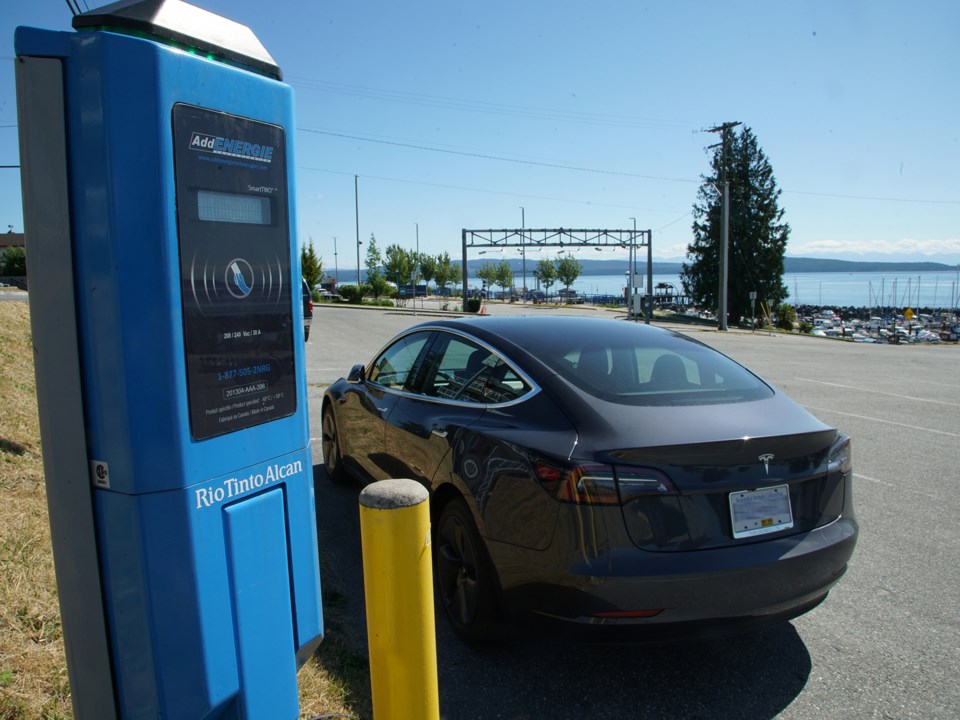City of Powell River Council will consider charging fees to use city-owned electric vehicle (EV) charging stations.
At the committee of the whole meeting on Tuesday, December 17, Ana Lukyanova, the city’s sustainability planner, provided a report into the prospect of charging an hourly fee to use the charging stations.
Lukyanova said there are seven city-owned, level-two EV charging stations at city hall, the north boat harbour, Powell River Public Library and Powell River Recreation Complex. All stations currently operate free of charge, she added.
BC Hydro has also installed a level-three fast charger at the north harbour parking lot, which is one level up in terms of power over the level two; the latter charges EVs in about 40 minutes. Lukyanova said BC Hydro is covering the cost of power at that station and the city is seeing increased use of EV charging stations every year.
“The usage has been more than doubling every year,” said Lukyanova. “In fact, for 2019, the data is for until the end of October, and probably by the end of the year, the number of users will more than triple over 2018.”
She said looking at how much the stations are used, based on 2019 data, the average is four and a half hours a day.
One thing noticed when examining the data is that 30 per cent of the time, vehicles are plugged in but they are not charging. Lukyanova said this means people are using the library or recreation complex and the cars are fully charged but remain plugged in, limiting access to charging for other users.
“They are not moving away from the parking spot and allowing other users to come in,” she added.
She said there have been conversations with the EV charging station provider, a company called FLO, and the company’s suggestion was to introduce an hourly charge to incentivize users to only use the station for as long as owners need to charge their vehicles.
Lukyanova said the proposal was for fees, if collected, to go to general revenues and the climate action reserve fund. She said fees that cover electricity costs could go to general revenues and the remainder could go to the climate action reserve to fund new EV infrastructure going forward.
Lukyanova said there are two options for fees. Option A is for $1 per hour for charging and option B is for $2 per hour. She said that is within the range of what is seen nationally. A dollar per hour is at the lower end and $2 per hour is at the higher end.
Lukyanova said the report to the committee of the whole was coming from the climate change mitigation and adaptation committee, which is recommending the $2 per hour fee.
The average charging session is two hours, which would translate to a $4 fee for the users.
The $1 per hour fee would cover electricity costs for the city but may not be substantial enough to discourage leaving vehicles plugged in without charging. The lower rate does not generate enough revenue to help the city expand the EV charging infrastructure.
Lukyanova said the $2 per hour fee is still low enough to keep charging affordable and will cover the costs for the city. The more substantial fee is more likely to discourage users from leaving their cars plugged in without charging, she said. It would also provide a small revenue stream to help expand EV charging stations in the future.
Option B would have resulted in $7,411 in revenue in the first 10 months of 2019, with $1,519 of that going to electricity costs. That would have provided revenue of $5,892.
Under option A, electricity costs would remain the same, with revenue of $2,186.
City councillor CaroleAnn Leishman said the presentation provided a good breakdown of the options. She said she had spoken with EV users and nobody was opposed to the $2 fee.
“Most people thought the $2 an hour fee was fair and would help contribute to the building of more infrastructure,” said Leishman. “Electric vehicles owners are not buying them because the city has free charging. It has been a bonus for them and the reason we did that in the beginning was to encourage people to buy electric vehicles.
“I would be totally in favour of $2 an hour because that actually puts a little more incentive into getting off the charger.”
Committee of the whole gave unanimous consent to send the matter to city council for consideration.



